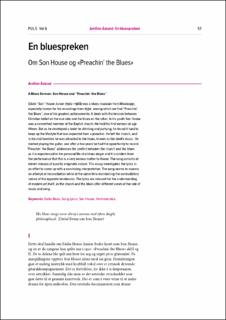En bluespreken: Om Son House og «Preachin’ the Blues»
Journal article, Peer reviewed
Published version
Permanent lenke
https://hdl.handle.net/11250/2766501Utgivelsesdato
2021Metadata
Vis full innførselSamlinger
Originalversjon
Åslund, A. (2021). En bluespreken Om Son House og «Preachin’ the Blues». Puls - Journal for ethnomusicology and ethnochoreology, 6, 57-80.Sammendrag
Eddie “Son” House Junior (1902-1988) was a blues musician from Mississippi, especially known for his recordings from 1930, among which we find “Preachin’ the Blues”, one of his greatest achievements. It deals with the tension between Christian belief on the one side and the blues on the other. In his youth Son House was a committed member of the Baptist church. He held his first sermon at age fifteen. But as he developed a taste for drinking and partying, he found it hard to keep up the lifestyle that was expected from a preacher. He left the church, and in his mid-twenties he was attracted to the blues, known as the devil’s music. He started playing the guitar, and after a few years he had the opportunity to record. “Preachin’ the Blues” addresses the conflict between the church and the blues as it is experienced in the personal life of a blues singer and it is evident from the performance that this is a very serious matter to House. The song consists of eleven stanzas of a partly enigmatic nature. This essay investigates the lyrics in an effort to come up with a convincing interpretation. The song seems to express an attempt at reconciliation while at the same time maintaining the contradictory nature of the opposite tendencies. The lyrics are relevant for the understanding of modern art itself, as the church and the blues offer different views of the role of music and song.
